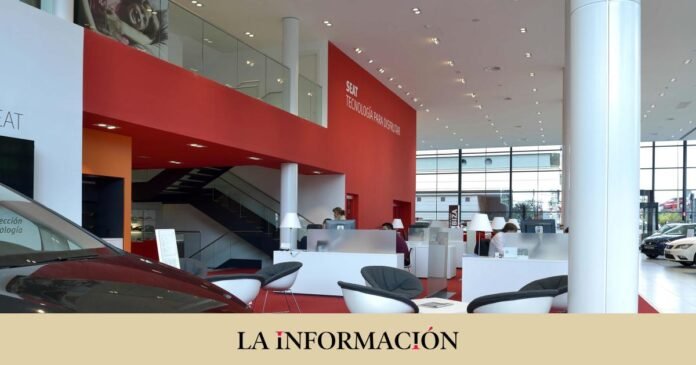Sales of new passenger cars and SUVs rose to 586,626 during the first seven months of the year, 22% more than in the same period of 2022, but still 27% below 2019, before the coronavirus pandemic. Only during the past month, sales increased by 10.7%. This is how Efe collects it from the data provided by the associations of automobile manufacturers, Anfac, and distributors, Faconauto and Ganvam. Between January and July, car deliveries in the private channel stood at 239,109 units, 14.7% more. The companies acquired 236,164 units in the period, 16.6% more, while those of ‘rent a car’ registered 111,353 units, 59% more.
The sector that both the diameter of the production rhythms and the push of the business channel have allowed it to increase in sales. However, they have remarked that in the month of July sales are usually above 100,000 units, so the uncertainty of the electoral period could have been “a determining factor” for not reaching these numbers.
Seven months positive
With this figure registered in July, seven positive months have been chained, accumulating 586,626 units, 21.9% more than the same period of the previous year, although the data is still 27% lower than the sales made in 2019. , before the pandemic. For its part, registrations of passenger cars for leasing stood at 20,930 units, which translates into an increase of 6.9% in the year-on-year comparison, while between January and July the increase in this channel was 22.3 %, up to 154,559 units.
The average CO2 emissions of passenger cars sold in July stood at 119.3 grams of CO2 per kilometer traveled, 2.55% lower than the average emissions of new passenger cars sold in the same month of 2022. So far From 2023, emissions stand at 118.5 grams of CO2 per kilometer travelled, 2.14% less than the same period of the previous year.
Registrations of light commercial vehicles reached 12,618 units in the seventh month, representing an increase of 11.8% compared to last year. Until the month of July, the market registered an improvement of 24.1%, with a total of 84,772 units. Regarding channel sales, companies and renters managed to grow compared to the previous year, with an improvement of 40.6% (8,914 units) and 19.5% (1,772 units), respectively. For their part, sales to the self-employed fell by 44.2%, with 1,932 units.
The figures for industrial vehicles
In July, the registrations of industrial vehicles, buses, coaches and minibuses achieved an increase of 55.2%, with a total of 2,875 units, with which in the first seven months sales were reached 18,047, improving by 25.2%. the same period of the previous year. By type, industrial vehicles continue their growth streak, with 55.9% in July and 2,695 units. For their part, buses, coaches and minibuses, with 108 sales in the month, improved by 45.2%.
The new government should help purchase
In light of these data, Anfac’s director of communication and marketing, Félix García, highlighted that although July continues the upward trend so far this year, this month “used to be one of the months in which the 100,000 units sold and we’re a long way off.” In addition, he has assured that it is a “priority” for the new government to take measures to recover the market, which must be, at least, “above a million units”. “Without this level of sales, the necessary renewal of the park does not take place, nor does the sales of low- and zero-emission vehicles increase,” he declared.
For his part, the communication director of Faconauto, Raúl Morales, has considered that the growth in the month of July is “the most important thing in the registration data”, since it continues to grow and does not show “weakness”, although he has assured that “We are 30% below 2019”, according to Europa Press.
“Our forecast for the second half of the year is that this growth in vehicle sales will continue because it seems that the economic and consumer context will favor us. But for this it is also very important that the political context accompanies us and it is essential that a stable government be formed as soon as possible,” he said.
“Political uncertainty increases the risk that the economy will slow down”
Lastly, Ganvam’s Director of Communication, Tania Puche, regretted that July registrations closed below 100,000 units, in a month that “used to be one of the best of the year.”
“Political uncertainty increases the risk that the economy will slow down, in a context that already contains business and household consumption, above all, as a consequence of the rise in interest rates derived from the tightening of monetary policies” , has declared. “Hence the need to achieve a stable government as soon as possible that contributes to projecting a horizon of tranquility for consumers,” Puche completed.

